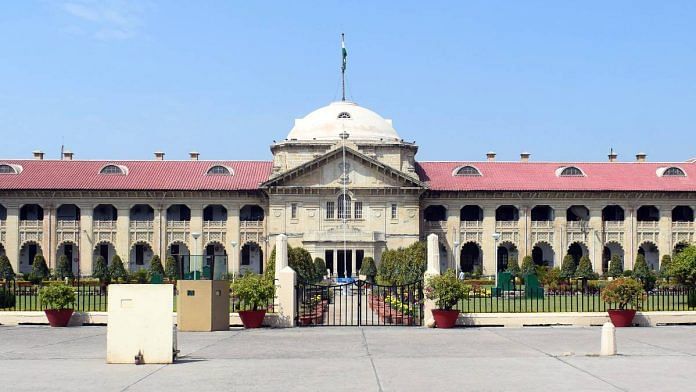New Delhi: The Allahabad High Court has said that registering a second FIR in a case with the same background is legally valid if it reveals new facts and/or concerns different offences, rejecting the argument that only one FIR can be filed related to an incident.
A two-judge bench of Justices Chandra Dhari Singh and Lakshmi Kant Shukla dismissed a plea by four men, who had sought to quash an FIR on a forgery case related to a fake business and stay their arrest.
“The present FIR discloses new and distinct offences allegedly committed after registration of the first case. The bar against a second FIR operates only where both relate to the same incident or transaction,” the court said in its 30 October order.
The two FIRs
The four accused allegedly ran an organised syndicate engaged in cheating and forgery through online channels.
Acting in concert, one of the accused allegedly convinced the complainant’s brother in 2019 to invest over Rs 7 lakh in a business venture operating under the name ‘QNet’, which – he believed — dealt with travel packages and health products.
Consequently, an FIR for cheating was registered in Ghaziabad in 2021.
As investigation into the case was underway, the accused allegedly fabricated documents, including a ‘Declaration and Distributor Application Form’ that bore the names of the complaint and his family.
Affixed with forged signatures and a fake notary seal, these documents were allegedly submitted by the accused to police to mislead the probe in the cheating case.
Two years later, when the notary denied having attested or signed the documents, a second FIR on charges of forgery was registered.
Also Read: Delhi HC’s guidelines on maintenance cases: ‘Human stories, not mere legal disputes’
Legal framework
In its order, the HC noted that its power to quash an FIR must be exercised sparingly and only in rare cases where the complaint does not disclose any cognisable offence or where investigation would amount to an abuse of process.
Citing the 1992 ruling in the State of Haryana vs Bhajan Lal case, the bench said an FIR can be quashed only when allegations don’t disclose commission of any offence, or are absurd, inherently improbable, or driven by malicious intent.
On whether a second FIR can be registered in a case with the same background, the court referenced a 2001 ruling (T.T. Antony v. State of Kerala), which held that registration of a second FIR for the same incident is impermissible and violates Article 21 of the Constitution.
But the bench pointed to subsequent Supreme Court rulings, including Anju Chaudhary vs State of UP (2013), which clarified that a second FIR can be registered if it relates to a different incident, discloses a distinct offence, or reveals a new dimension not covered earlier.
The ‘test of sameness’
Applying the “test of sameness” from the 2013 case, the high court bench ruled that when both FIRs relate to the same incident or occurrence, the second FIR is not maintainable. But if the second or subsequent FIR discloses a separate time, place and nature of offence, or reveals new facts or a larger conspiracy, it is legally permissible.
The court noted that the first FIR, registered in 2021, related to cheating and criminal breach of trust concerning the 2019 financial dealings. The second FIR, it said, dealt with distinct allegations of forgery, fabrication and use of forged documents.
“Therefore, while the two FIRs may refer to a common background of financial transactions between the parties, their scope, subject matter and period of commission are manifestly distinct,” the court observed.
It added, “The earlier FIR concerns inducement and cheating in respect of an investment and the present one concerns fabrication and use of false documents in judicial proceedings. The offences alleged in the latter are independent and self-contained, and cannot be said to have been the subject matter of the earlier investigation.”
Also Read: As SC looks at worth of life that could’ve been, how other countries deal with wrongful convictions






